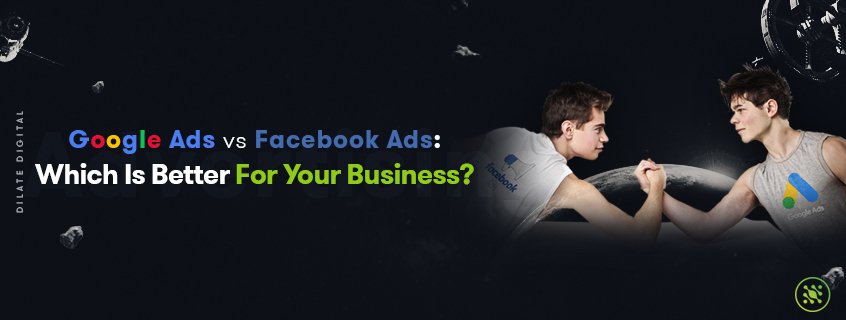

In online advertising, there is one debated topic which still remains as hot as ever: Google advertising vs Facebook advertising. People from both sides argue passionately about which is better, swearing by one or the other.
For a business owner or someone without a background in online marketing it can be really difficult to decide which is the best for you. With voices on either side of the debate, how can you know what’s good, sound advice?
Whether you’re clued up or confused, the reasons why you should choose Facebook vs Google advertising is worth getting right. Afterall, you want to be putting your money into advertising that’s really going to work, right?
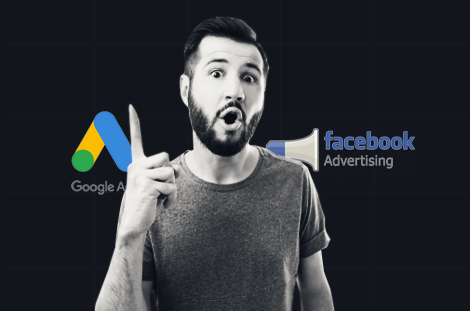 Spoiler: what’s our take?
Spoiler: what’s our take?We don’t really buy into the debate. Both Facebook Ads and Google Ads can do great things for a business, and sometimes the best results come from a winning combo of both types of ads.
Every business is unique. What works for one business might not be half as effective for another. The key to effective digital marketing is understanding what your business needs to thrive, and then developing a killer advertising strategy from there.
As a digital marketing agency, we’ve worked with heaps of clients to create effective Google AdWord and Facebook Marketing campaigns, so we know our way around the topic pretty well. If you’re feeling unsure where to put your advertising budget, we’ll share with you what we know.
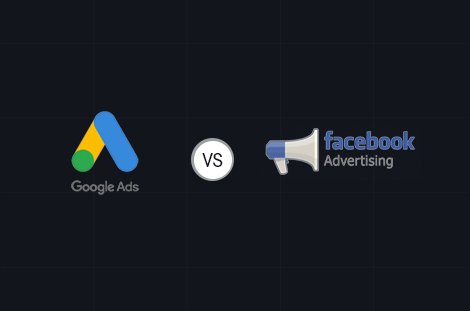
Google Ads and Facebook Ads are platforms for getting your product or service in the eyes of potential buyers. Got that, but what’s different about them? And what advantages does one offer over the other?
Let’s dive in and take a look at both in depth.
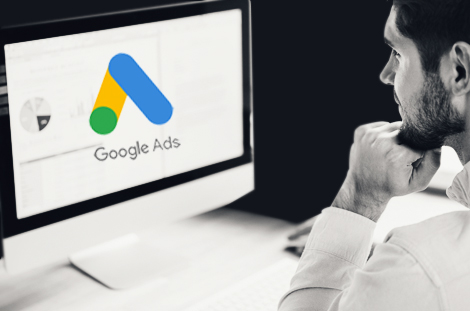 What you need to know about Google Ads
What you need to know about Google AdsWe all know how popular Google is. Everyday billions of searches are made as a massive chunk of internet users are jumping on Google to find what they’re looking for, however specific, strange or rare it might be. And that includes searching for potential purchases they might make, or services they might want to engage.
Advertising on Google is called Google Ads (aka Google AdWords) and is the biggest pay per click (PPC) advertising platform in the world. PPC means advertisers pay only when someone clicks on their ad. Google Ads is referred to as ‘paid search’ advertising because the ads reach people who have searched for something specific.
Let’s take a closer look at how it works. Imagine someone dreaming of their next holiday does a quick Google search of “flights to Bali from Perth”. The image below shows the results.
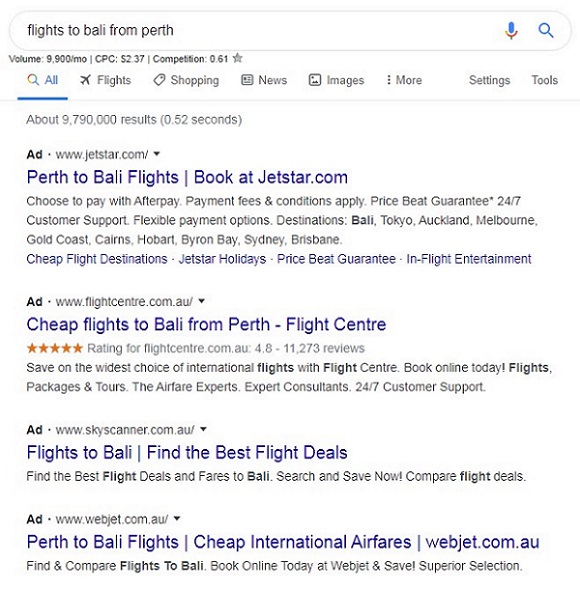
Above all of the main search results, Google shows me a series of ads by flight agencies. They look like any other search result except for the bold word “Ad” at the start. Notice how each ad has a variation of the same keywords ‘Perth to Bali’ and ‘flights’, making these results specific to my search query.
Those who want to advertise using Google Ads must create a text-only ad and bid for the particular keywords they want to target. The keywords you bid on should be what potential clients would be searching to find your business. How much you have to bid on the keywords will depend on how popular they are, or even what industry they’re part of.
So how does Google choose which ads to show us? Although the amount of money you’re willing to spend makes a difference, it’s not just the highest bidder who always wins. Google wants to show its users relevant, satisfying results. So well written, relevant ads will get shown over poorly written, confusing ones.
Advertisers on Google Ads pay each time their ad is clicked on. That means, you’re only spending money if a potential customer clicks through to your website. Your $$ is being spent on people who are that much more likely to be interested in what you’re offering.
As an advertiser, you can also target your ads to people searching for your keywords from a particular geographic region. That means if you’re based in Perth, you can show your ad to people searching from Perth, helping you put your ad in front of more local customers.
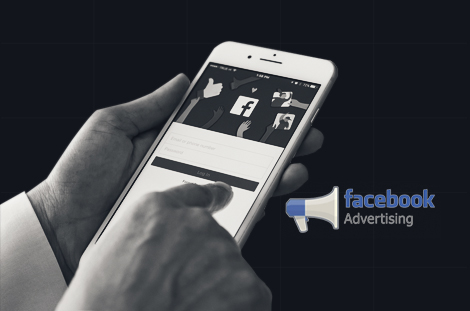 What you need to know about Facebook Ads
What you need to know about Facebook AdsDo I even need to talk about how powerful Facebook is? As one of the social media giants, Facebook has changed the way consumers behave, and has opened up a world of possibility for consumers and businesses alike.
Remember how I said Google Ads was dubbed ‘paid search’? Well Facebook Ads are referred to as ‘paid social’. Paid search uses keywords to help businesses find customers, but paid social is all about helping users find businesses that they’re interested in.
Facebook has collected a lot of data on what people like, topics they’re interested in, life circumstances they’re experiencing and ways they behave online. All of this social data can be used to help advertisers target their ads to a refined audience.
Facebook Ads allows advertisers to select specific qualities or data points to create a targeted audience. You can choose what you want your audience profile to be based on a wide range of demographics, behaviours, likes and dislikes. In the end, you’re able to create a highly targeted audience of people who are more likely to engage with your business.
For example, if you’re a wedding vendor, it’d be a waste to have your ads being shown to recently married people - now that they’ve had their wedding, they’ve no use for your services anymore. But with Facebook Ads, you can refine your audience so your ad gets put in front of recently engaged women who live in your area. What’s more, to get your ad seen by brides who would like your brand, you can target your audience even more by using likes, dislikes and other data points.
One of the really powerful things about Facebook Ads is the ability to retarget customers who have previously visited your page or interacted with you. Maybe they didn’t purchase anything last time, but their interaction shows they had interest. Retargeting reminds them that you’re still here, and helps you reinforce your campaign.
Facebook offers advertisers a range of different ad formats including ones for images, videos and carousels. You can use this to your advantage to create an eye-catching ad that your target audience will respond well too. The ads appear in Facebook users’ feeds as they scroll and can be linked to a website landing page that allows you to take customers where you want them to go and gives you an opportunity to win them over.
So now that we’ve looked at what sets Google Ads and Facebook Ads apart, let’s spend some time understanding the advantages of each.
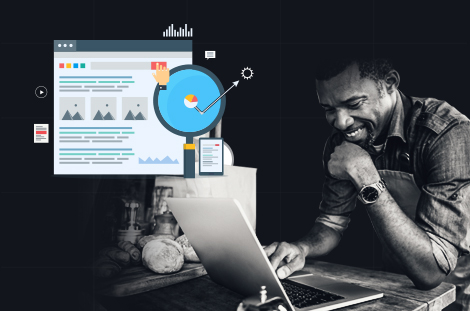 The advantages of using Google Ads
The advantages of using Google AdsOver a trillion searches are made on Google every year. That means a lot of people are using Google a lot of the time. Thanks to advanced search engine and artificial intelligence technology, Google is only getting more sophisticated, which means it’s likely to be on top for a good while longer.
This all goes to say, there’s no other search engine offering the same potential reach as Google. Combined with really accurate search results, Google Ads can be reliably used to reach the right people. No wonder it’s the most popular PPC platform in the world!
Although many other advertising platforms benefit those who can pay the most, Google takes a slightly different route. You see, Google is really keen to give its users results that they’ll be satisfied with. That means showing them quality content that’s exactly (or as close as possible to) what they’re looking for.
The most relevant and quality ads won’t have to bid as high as those with poor ads. Sure, certain keywords may cost more than other keywords, but how much advertisers have to bid depends heavily on the quality and relevance of their ads.
Practically, this means if you do a really good job at writing an engaging, relevant ad, you probably won’t be spending as much as those who are making common Google Ad mistakes.
Who will be clicking on your Google Ads? People who are searching for the keywords you target. This most often means they’re on the hunt for what you can give them, and ready to spend money.
In comparison, Facebook users aren’t necessarily on there to buy something. They may simply be scrolling through their feed or catching up on the latest gossip. If someone’s prepared to buy, they’re more likely to do so which is one of the main advantages of Google Ads.
Now onto Facebook.
 The advantages of using Facebook Ads
The advantages of using Facebook AdsFacebook has billions of users, so like Google, it’s got the potential to reach a lot of people all over the globe. However, the real advantage for Facebook is the ability to target users in a very specific and precise way.
Facebook users are wittingly or unwittingly sharing a whole lot of information about themselves every time they use the platform. Facebook collects data on everything from users’ favourite movies and weekend hobbies to their ideologies, political leanings and beliefs. Don’t forget Facebook also collects data on where a person lives, their workplace and education, as well as their age, gender and relationship status.
All of this goes to say that with Facebook advertisers have an incredible pool of data they can use to help put their ads in front of those who would be interested. And businesses can grow their audience by targeting others whose profiles are similar to their existing audience.
Unlike Google, which is text based advertising, Facebook offers advertisers the power of visual advertising. Photos, videos and other visual content can be used in Facebook Ads to help grab the attention of potential customers. The ads fit in with the other content in a user’s news feed, giving businesses the opportunity to persuade their audience with compelling content. Visual content also means you can quickly communicate your brand to your audience.
We all know the saying ‘a picture is worth a thousand words’, and for some advertisers this is the philosophy that draws them to Facebook Ads. Especially today when so many people are used to scrolling past anything that looks like an ad.
The strength of Facebook Ads really shines for businesses that are looking to grow awareness about their products or services. It allows businesses to put their name and brand in front of a targeted audience, and to start building trust.
Especially for new products and businesses, Facebook Ads can be an effective way of getting your name out there. People aren’t as likely to buy something if it’s their first time hearing about it, so Facebook Ads is helpful for growing brand awareness, and building trust with the right people.
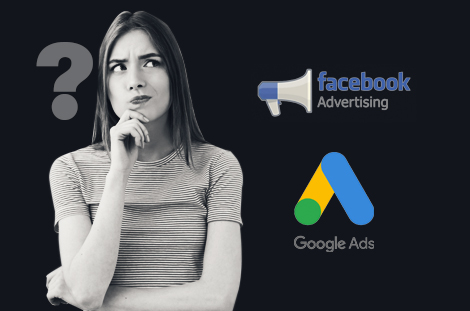 Which is cheaper Google Ads or Facebook Ads?
Which is cheaper Google Ads or Facebook Ads?At Dilate, we get it. You have a limited budget to spend on advertising and so it’s important to get your head around what each might cost you. Adding up all the numbers, is investing in Google Ads or Facebook Ads worth it?
Both Facebook Ads and Google Ads are PPC platforms, meaning advertisers only pay when someone clicks on their ad. This study suggests Facebook has an average cost per click of $1.72 USD compared to the results of this study which put the cost of Google Adwords at an average $2.69 USD per click. However, it’s important to remember that for both Facebook and Google advertising, your industry is likely to impact the overall cost.
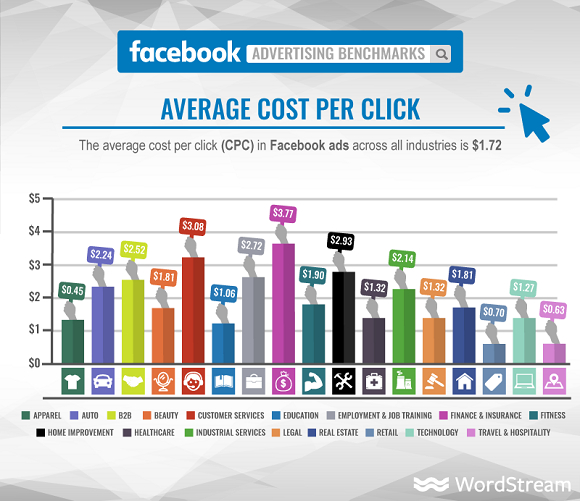
Source: Wordstream
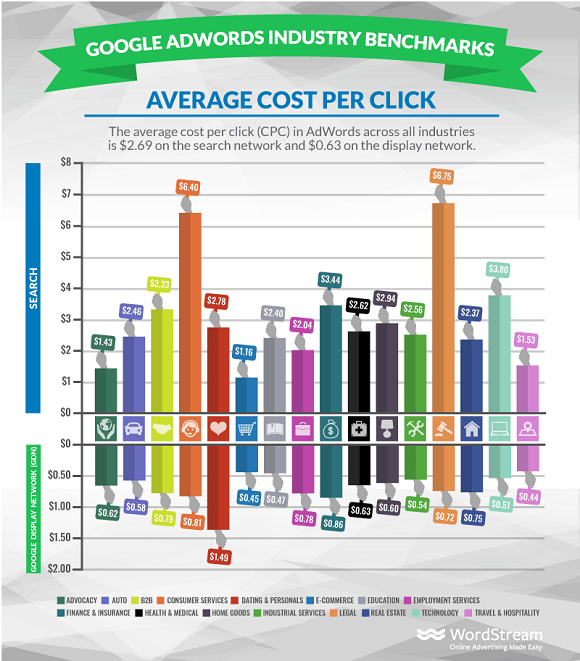
Source: Wordstream
For Google Ads, advertisers bid for particular keywords. If yours is the highest bid (as well as having relevant, well-written copy) your ad will be shown when someone searches for the keywords. Different keywords will have varying costs, and some can be incredibly expensive such as “lawyer” ($46.25), “insurance” ($22.62) and “health and fitness” ($20.81).

Source: Wordstream
For those on a very tight budget, Facebook is more affordable because it allows you to set up an ad campaign for as little as $5 a day. Whatever your budget, the most important thing is to use your money in a smart way to get the best results possible. Throwing a whole lot of money at advertising without a good strategy is a waste. But even a small budget used wisely can achieve good results.
 What is the ROI for Google Advertising vs Facebook Advertising?
What is the ROI for Google Advertising vs Facebook Advertising?Nowadays businesses have a lot of awesome tools at their fingertips to help them monitor how effective their ads are. This means the possibility of more targeted and efficient advertising that gets the job done without breaking the bank.
If you can analyse and understand the data that Google or Facebook gives you about your ads, you’ll be able to streamline your advertising, and put your money where it works. That being said, figuring out the Return on Investment (ROI) for an advertising platform takes some time and it won’t be the same for everyone.
Did you know advertising platforms tag everytime someone visits your website through an ad? Plus the tag can follow them while they make a purchase or not. Having these details available can help you streamline your ad campaigns to make them more successful.
At Dilate, we’ve got a team who are passionate about getting to the nitty gritty of these details. Maybe it’s a little nerdy, but we get a high from seeing amazing results from our clients’ ad campaigns.
We’ve gotten pretty good at using the data from Google and Facebook, as well as generating our own data by tracking visitors on our clients’ websites. Using all this info, we’re able to do cool things such as retargeting people who have visited your website in the past.
Using a whole range of techniques in a smart way is how you see a great ROI for both Facebook and Google Ads. But deciding how to advertise to get the best ROI comes down to your unique situation. What works for another business might not work for yours.
 The impact of industry & niche on online advertising
The impact of industry & niche on online advertisingThe industry or niche you classify your business under may affect how well your ads perform on Google or Facebook. Because Facebook is a social network, ads for particular niches related to lifestyle and culture (think apparel, travel, entertainment) tend to perform better than industries such as legal or financial services.
A simplified way of looking at it is: industries that rely on emotional buying tend to work better on Facebook whereas Adwords does better for products and services which people don’t buy solely on the basis of emotion.
Think about it, someone scrolling on Facebook isn’t necessarily searching for something to buy. So ads for products which are impulse buys will tend to do better. On the other hand, someone searching on Google for a particular product is looking to buy. So on Adwords, ads for products which require more deliberation and decision making tend to perform better.
That being said, these are tendencies and not set-in-stone rules. Just because your business is within an industry that doesn’t normally perform well on one platform, doesn’t mean you can’t use it effectively. Savvy and smart strategies can still be used to work in your favour, if you’re willing to put the effort in.
 What to ask yourself before deciding why Facebook vs Google advertising
What to ask yourself before deciding why Facebook vs Google advertising So now you know a bit about Facebook and Google advertising, it’s time to think more deeply about your unique situation. Once you’ve got a solid understanding your business and target audience, you’ve got a great foundation to help you make the right choice about what platform to advertise on if not both.
Start by asking yourself these questions:
We hope the information in this article has made at least one thing clear: both Google Ads and Facebook Ads are incredibly powerful tools that can be used to grow your business. Instead of seeing them on opposite sides of a debate, it’s much more useful to think of them as two tools in your belt that you can use separately or simultaneously to achieve amazing results for your business.
Though it’d be nice, there is no simple answer to the Google Ads vs Facebook Ads debate. Taking advantage of these powerful tools comes down to knowing your business objectives and your audience very well.
At Dilate Digital, we understand your business is unique, and a one-size-fits-all approach won’t cut it. We work with businesses to help them create a tailored strategy for online advertising that actually works.
If you need assistance with creating effective strategies for Facebook Marketing or Google Adwords in Perth and beyond, why not get in touch with us today? Our team is ready to help you create killer ads that lower your cost per click and improve your conversion rate, so that you can take your business to the next level.
what our clients are saying
create business. better everyday.
Let's Talklearn from the best minds in the business
Bodie provides some insight into Dilate's internal operations. How we approach what we do, and how we strive to be Better Everyday.





